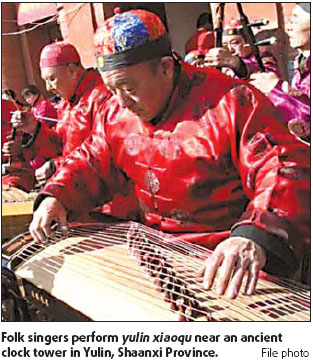Set to sing songs that say so much

An international folk song festival will be held from August 24 to 27 at the foot of a Great Wall section located in Yulin, Northwest China's Shaanxi Province. Musicians from Russia and the United States will share the stage with Chinese artists, including Wang Xiangrong and Sun Zhikuan, both acclaimed folk singers in northern Shaanxi.
One of the highlights of the festival is the performance of yulin xiaoqu, a unique local ballad that is inscribed on the National List of Intangible Cultural Heritage. A representative genre of Chinese folk songs, the folk song of northern Shaanxi has shaped the distinctive Loess Plateau culture.
The history of Yulin can be traced back to hundreds of years ago, when the cultures of the Han people and nomadic tribes outside the Great Wall collided and merged in this border town.
Yulin became one of the strategic fortress towns guarded by a heavy garrison in Ming Dynasty (1368-1644). The large-scale immigration from across the nation further diversified the local culture.
Among them, it is said that at least 70 percent of officials came from the southern lower reaches of Yangtze River. They brought from their hometowns many oral folk arts where the basic tunes of yulin xiaoqu evolved, such as sizhu (stringed and woodwind music), pingtan (storytelling and ballad singing in the dialect of Suzhou, East China's Jiangsu Province) and Huagu Opera of Central China's Hunan Province.
Yulin xiaoqu was at first entertainment for the officials and the garrison. It then spread out among locals, who enriched the tunes by absorbing local dialects and northern folk melodies. And it has gradually matured into a ballad that embraces both the resonant and bold notes of North China and the soft and sweet style of South China.
The ballad covers just about every aspect of people's life, ranging from sorrows of parting to dramatic love affairs. It has vivid descriptions of the stories in tea houses and restaurants, tales from street vendors and porters, and folklore and legends. It is endowed with a thick flavor of urban interests, in a noticeable comparison to the plain and straightforward songs of the mountainous area.
Yulin xiaoqu is performed by one or two people, who accompany traditional instruments including the dulcimer, guzheng (zither-like plucked musical instrument), pipa (string instrument with a fretted fingerboard) and jinghu (Peking Opera fiddle).
The orchestra would play one or two pieces to silent the audience at the beginning. Then lead singers start to chant following the beats created by tapping plates. The performance normally lasts three to four hours.
It used to be a custom in Yulin that people invited ballad singers to perform at their homes during festivals, birthdays, funerals and weddings.
But the tradition has almost died out, and only 60 tunes are preserved. Locals today enjoy irregular shows staged by a local research association of yulin xiaoqu that has more than 60 registered veteran singers.
(China Daily 08/21/2007 page19)














